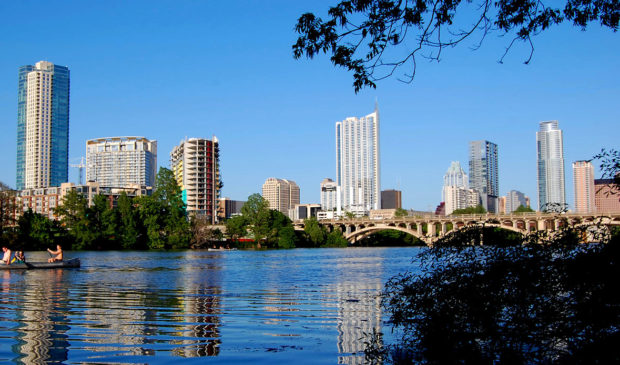About the Author
Chad Swiatecki is a 20-year journalist who relocated to Austin from his home state of Michigan in 2008. He most enjoys covering the intersection of arts, business and local/state politics. He has written for Rolling Stone, Spin, New York Daily News, Texas Monthly, Austin American-Statesman and many other regional and national outlets.
Newsletter Signup
The Austin Monitor thanks its sponsors. Become one.
Most Popular Stories
- Democrats vs. Republicans: First election coming for Travis Central Appraisal District board
- New federal cash paves way for East Austin’s ‘wishbone’ bridge over Lady Bird Lake
- Austin’s airport is getting a new concourse and 20 more gates but not until the 2030s
- New rules in the works for electric vehicle charging stations
- Budget deficit looms over city this year and beyond
-
Discover News By District

With hotel tax money in play, Tourism Commission meetings grow heated
Tuesday, September 11, 2018 by Chad Swiatecki
The second meeting of the city’s new Tourism Commission saw the group vote down a possible $3 million marketing campaign for local live music, while also dusting off the long-running debate about public safety expenses for the South by Southwest festival and again failing to elect a chair.
Last Tuesday’s meeting saw a brief reprise of a stalemate started at the group’s first meeting, between 10 members of the 11-member body vying to elect either Michael Searle or Catlin Whitington as chair. One round of voting saw commissioners John Riedie, Bill Bunch, Vanessa Fuentes, Kate Singleton and Searle tying with Whitington, Mary Stout, Ed Bailey, Rachel Magee and Scott Joslove, with appointee Michael Cannatti still not officially seated as a commissioner. The debate on Sept. 4 included concerns from Riedie and others that Whitington, who is in a leadership role with SXSW, could have undue influence over decisions regarding the Austin Convention Center, which counts the festival as its single biggest event client.
The impasse means city staff will continue to chair the meetings until Cannatti can be seated and serve as the deciding vote.
Nearly two hours of presentations and discussion on the laws covering use of the city’s Hotel Occupancy Tax funds and the budgets of the city’s Convention Center Department and the facility itself saw something of a line form between commissioners for and against a proposed $600 million expansion of the facility.
That struggle played out in a few different ways. Riedie, who is also CEO of the Austin Creative Alliance, made a motion to ask the city manager’s office to research and suggest a way for $3 million in the city’s next budget – almost certainly from HOT money – to be used to market local live music.
That motion failed 4-6, with Riedie, Bunch, Singleton and Searle supporting, with those voting against arguing City Council is too far into the budget process to accommodate that allocation and that other groups need to be considered for similar funding.
There is also a question as to whether such a marketing program would count against the state-mandated cap of 15 percent of HOT money that can be used for the support of cultural arts.
“I don’t think we’re at the point to start allocating money,” Joslove said of the recently formed commission. “I wish that we had started earlier so that we could do a deep dive. There’s a lot of groups that would feel shortchanged if we were to vote right now to allocate money or recommend to the city manager to come back with one proposal about one discrete entity.”
Riedie answered that the city’s Visitor Impact Task Force formed last year to examine the best use of HOT money repeatedly suggested a $3 million expenditure in support of live music in Austin.
“How many industries are in our city slogan? I think it should be prioritized,” Riedie said. “I know for a fact that there’s a plan being developed in the community to spend $3 million for music. We’re just asking the city manager to look into the legal ramifications.”
Riedie, Bunch and Searle also called into question the convention center’s practice of saving money for possible land acquisition and bond expenses for the potential expansion instead of using that money to pay off remaining debt for the center’s 1998 expansion.
Searle, a former chief of staff for Council Member Ellen Troxclair, also revived a frequent argument against the city’s waiver of the $1.2 million in public safety costs incurred during SXSW – or “spring festival season,” the city’s catchall for activities not directly associated with the festival.
Troxclair and others have frequently characterized that waiver as a decision that costs city taxpayers, with some pushing for HOT money to reimburse the General Fund, though Joslove shot back that the sales tax revenues and other economic impacts of the festival easily offset the public safety costs.
“Yes we have a law enforcement system that is paid for by property tax, but hotels pay property tax, the income-producing properties pay property tax. And that’s not even to mention the incremental revenue that you’re going to see,” he said. “The sales tax from alcohol alone more than covers the police cost. There’s no doubt the incremental revenue from South By far exceeds the public safety expense.”
Photo by LoneStarMike [CC BY-SA 3.0], from Wikimedia Commons.
The Austin Monitor’s work is made possible by donations from the community. Though our reporting covers donors from time to time, we are careful to keep business and editorial efforts separate while maintaining transparency. A complete list of donors is available here, and our code of ethics is explained here.
You're a community leader
And we’re honored you look to us for serious, in-depth news. You know a strong community needs local and dedicated watchdog reporting. We’re here for you and that won’t change. Now will you take the powerful next step and support our nonprofit news organization?









